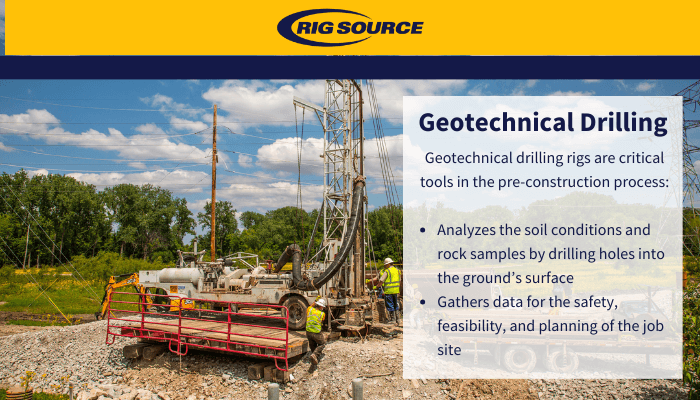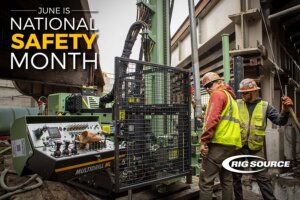Geotechnical drilling is a specialized and critical method to study and explore the materials beneath the ground. It involves drilling into the ground to obtain information about the soil and rock layers beneath the surface. This information is crucial for understanding the geological conditions of a job site, which is essential for safe and efficient construction, mining, and environmental projects. Geotechnical drilling plays a vital role in this understanding. It helps assess the ground’s stability, strength, and physical properties, ensuring drillers build structures on solid foundations. This process is essential in planning any construction project because it prevents unpredictable complications that could arise due to unknown subsurface conditions.
Geotechnical engineers are the experts who interpret the data obtained from geotechnical drilling projects. They analyze the soil and rock samples, understanding the characteristics and conditions. This analysis is essential in designing foundations, predicting and mitigating potential ground movements, and ensuring that any construction follows safety regulations. Overall, geotechnical engineers bridge the gap between the materials beneath the ground and the practical needs of construction and development.
Geotechnical Investigation
Geotechnical investigation is an essential, in-depth process for assessing the conditions of a job site for construction or other land use purposes. It goes beyond just surface analysis to provide a comprehensive understanding of the ground conditions. The main goal is gathering data for the safety, feasibility, and planning of a construction or development project. This process is crucial for any project’s success, ensuring the ground conditions are thoroughly examined and accounted for before the construction begins.
There are several types of geotechnical investigations, each catering to specific project needs.
- Subsurface Investigations: These methods involve drilling into the ground to collect soil samples and study underlying rock formations. This is the primary data source for a geotechnical engineering report and is essential for understanding the makeup of a construction site.
- Cone Penetration Testing (CPT): This method uses a cone-shaped device to determine the type of soil and subsurface conditions in the upper 100ft of ground. CPT provides valuable data on soil consistency and kind, which is essential for foundation design and planning.
- Site Investigations: This method involves information collection, data assessment, reporting, and appraisal. Geotechnical site investigations help strategize the best approaches for construction, ensuring optimal utilization of the job site’s area.
The Importance of Understanding Ground Conditions
Understanding subsurface soil conditions is a fundamental aspect of ensuring the longevity and safety of any construction project. By thoroughly analyzing the soil and rock layers beneath the ground, engineers predict how these materials will interact under different drill rig loads and conditions. This knowledge is vital for designing stable, robust, cost-effective, and environmentally friendly foundations. A solid understanding of subsurface conditions is integral to safe, sustainable, and successful construction.
As we move forward, we will detail the different methods and equipment used in geotechnical drilling, tying them back to the process of geotechnical investigation.
Drilling Methods and Equipment
There are various methods used in the geotechnical industry, each suited to specific project requirements and geological conditions. These methods include:
- Rotary Drilling: This fast drilling technique uses a rotary motion to drill into the Earth. It’s ideal for penetrating through hard rock layers, drilling large holes, obtaining rock samples for deep observation, and gathering information about coal deposits.
- Core Drilling: Core drilling extracts a cylindrical sample of the ground material, providing valuable information about the soil and rock layers. This information is crucial for building foundations, bridges, and tunnels.
- Direct Push Drilling: This method uses a percussion hammer to push tools and sensors directly into the ground without removing soil. This is a quick and efficient way to gather groundwater samples and evaluate the soil conditions for possible contamination.
- Mud Rotary Drilling: This technique, known for its speed and adaptability, circulates drilling mud fluid to remove drill cuttings from the hole. This method is effective for coring bedrock and keeping the borehole stable.
The success of geotechnical drilling projects depends on the quality and durability of the drilling equipment. Two key types of equipment for these projects include the hollow stem auger and large-diameter drilling rigs. The hollow stem auger is a type of drilling equipment used for softer ground conditions such as sands, slits, or clay. The process involves drilling and casing a hole simultaneously, collecting soil samples, and facilitating the installation of wells. On the other hand, large-diameter drilling rigs are best for drilling larger holes between 100 mm and 150 mm in diameter. They are essential in significant construction projects with deep and wide boreholes.
Importance of a Skilled Drilling Crew
Having a skilled crew of drillers is vital in geotechnical drilling jobs. The crew’s expertise ensures the correct usage of drilling equipment, maximizing the efficiency and accuracy of a project. They also play an integral role in interpreting field conditions and adjusting drilling techniques to meet the project’s needs. Overall, a skilled drilling crew ensures that the process provides accurate and reliable data for geotechnical analysis.
Applications of Geotechnical Drilling Rigs
Geotechnical drilling is integral to various industries, especially construction and civil engineering. It’s the first step to ensuring the soil’s bearing capacity in construction projects. It’s essential to ensure the ground can handle the intended structure, and it plays a role in the safety and durability of everything from residential buildings to large infrastructures. In civil engineering, geotechnical drilling details bridges, roads, and other infrastructure designs, helping the team identify potential hazards encountered during construction.
Detailed Procedures
The procedures involved in geotechnical drilling are detailed and purpose-driven. Core drilling methods extract core samples, offering direct data into soil conditions and rock properties critical for construction decisions. Additionally, geotechnical drilling facilitates the installation of monitoring instruments. These are essential for assessing the ground’s response to construction and natural changes over time. Establishing boring locations is another strategic aspect of geotechnical drilling. The placement of boreholes is carefully determined based on the project’s goals and initial site assessments. This ensures comprehensive data collection for accurate and reliable geotechnical analysis.
Selecting boring locations in geotechnical drilling is a critical and strategic process. This decision involves considering the project’s scope, the terrain’s characteristics, and the specific data required. Proper placement of boreholes is a crucial step, providing a representative understanding of the subsurface conditions.
The Value of Geotechnical Drilling
Geotechnical drilling is a critical process that adds significant value to clients, ensuring the safety and completion of their projects. This type of drilling provides clients with vital information and data such as soil stability, composition, and bearing capacity. These are all essential for quality control in any construction project. This data leads to well-informed decisions in your project, minimizing potential risks and costly errors. Additionally, comprehensive geotechnical reports provide a clear and detailed understanding of the job site, which is crucial for immediate project requirements and future reference.
For property owners, geotechnical drilling is an investment in the longevity of your structures. It provides an in-depth understanding of the soil and subsurface conditions. This is essential for designing robust structural foundations catered to the site’s specific characteristics. This understanding directly influences the durability of any building or structure, and it’s a valuable tool ensuring a secure investment for the future.
Rig Source’s Geotechnical Drilling Services
Rig Source is pivotal in supporting these valuable geotechnical drilling services. Our expertise and state-of-the-art equipment ensure clients receive precise and reliable data for completing their projects. Our commitment to excellence and innovation means clients can rely on us for supporting accurate assessments and high-quality drilling services. We’ve discovered how quality drilling equipment is essential for the success of any construction or development project, and the team at Rig Source understands this importance. Whether for a large-scale construction project, civil engineering job, or property development, we have the knowledge, skills, and capacity to provide the essential equipment. Contact Rig Source today and experience our unparalleled service and expertise in supporting your drilling needs.
Resources:
- “Geotechnical Drilling Rigs.” Geoprobe Systems. https://geoprobe.com/applications/geotechnical/geotechnical-drilling-rigs
- “Geotechnical Investigation.” ScienceDirect. https://www.sciencedirect.com/topics/engineering/geotechnical-investigation
- Rig Source. https://rigsourceinc.com/





